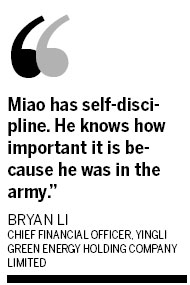Energy
Miao sees the sun shine on energy dream
By Zhang Qi and You Nuo (China Daily)
Updated: 2010-06-28 10:37
 |
Large Medium Small |
 "That is why you have a wide gap between lab results and the results from commercial production," Miao explained.
"That is why you have a wide gap between lab results and the results from commercial production," Miao explained.
"And solutions with superb lab results can die on the assembly line if the results in mass production are just too low and too unstable to make them worthwhile."
But Yingli, thanks to its extensive but actually more flexible production line, is expected to begin commercially manufacturing and distributing a new generation of products. That is coming to pass as some competitors, stuck with a shorter and more rigid production line, still struggling with the technology they have purchased but that has yet to meet the desired standards, industry analysts said.
A key innovation in Yingli today is the so-called high-efficiency N-type silicon solar cells, dubbed PANDA, a solution acquired from the Energy Research Center of the Netherlands (ECN).
After a year or so of adaptation, against a lab record of 21 percent in cell conversion efficiency rate, Yingli's engineers claim that, in commercial production, they are expecting to reach at least 18.5 percent for PANDA cells in the initial stages, compared with their old cells' current average conversion efficiency of 16.5 percent, and 15 percent in 2007.
Miao said, given some more time, PANDA will help Yingli achieve even higher conversion efficiency. "Our production line is rich in potentials," he said, adding competition would help Yingli prove its potentials.
Admittedly, Yingli's way is a major trade-off. Its massive buildup of fixed assets requires more money and manpower, sometimes a lot more, than that required to just make a quick profit.
As the company's production and sales skyrocketed, so did its costs. Nowadays, the company's staff size exceeds 6,000, according to chief financial officer Bryan Li.
In 2004, when Miao took the company into the solar business, it had no more than 600 employees. When it was listed on the New York Stock Exchange in 2007 it had a work force of 3,000.
Household name
In its hometown of Baoding, a city of one million, Yingli has grown into a household name. Vocational school graduates are yearning to join the company - to earn good pay (by local standards) and to be part of an up-and-coming industry, despite its semi-military style in shop floor discipline.
Even though Baoding is an inexpensive "small" city, the company has to maintain an increasing number of managerial elite with overseas experience and an even larger team of overseas sales representatives.
Chinese companies habitually do a few things when they grow large in difficult times. One is to freeze, if not cut down, staff pay. A second is to relocate to a cheaper place. The third is to try to make some quick money from sideline projects, such as real estate development.
Yingli has some houses. Miao also owns a number of farms. But, in comparison with its main business, they are but small toys. And the good thing is, said Bryan Li, Yingli's Shanghai-born CFO, the CEO has no interest in indulging in those little toys. "Miao has self-discipline. He knows how important it is because he was in the army," said Li
His army experience has also given him an art-of-war type vision about what steps to take today to meet what goals in the future.
There is no better way to make good use of Yingli's production line than trying to excel in its key operations, to make each of them strong and profitable. "I still have several big plans," Miao said. "PANDA is just the first to come along."



